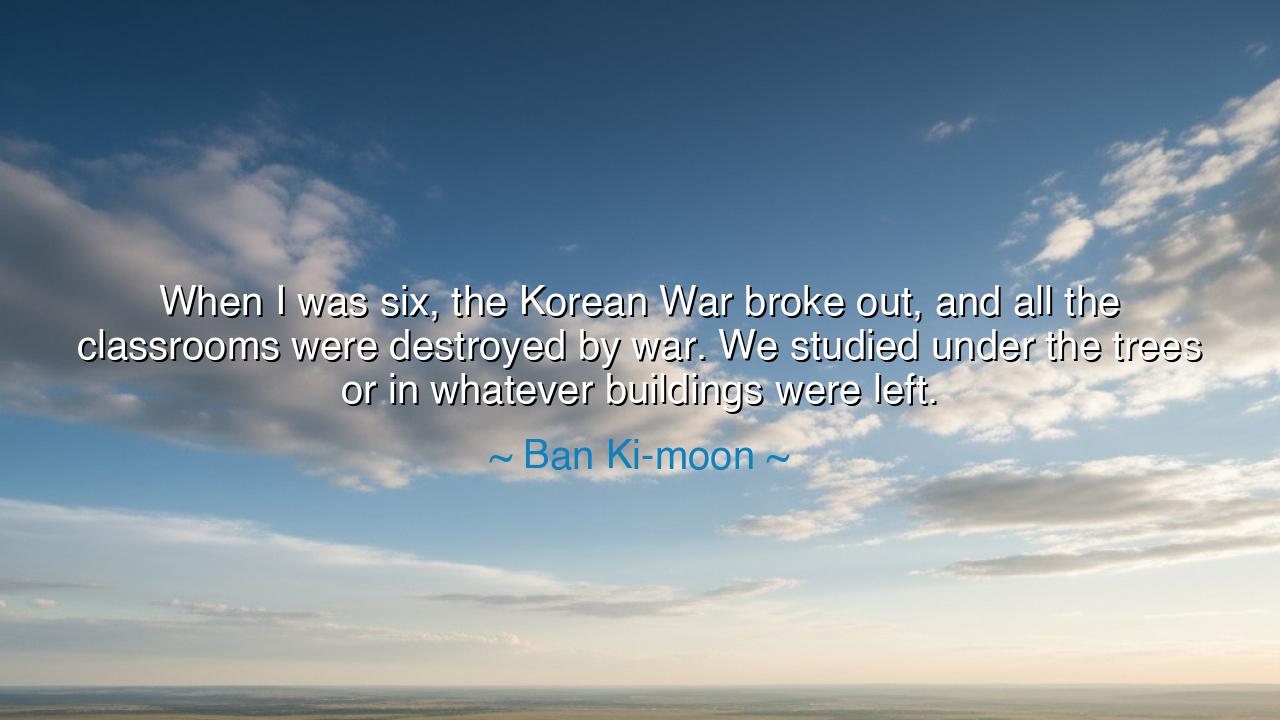
When I was six, the Korean War broke out, and all the classrooms
When I was six, the Korean War broke out, and all the classrooms were destroyed by war. We studied under the trees or in whatever buildings were left.






Hear, O listener, the tender yet unyielding memory of Ban Ki-moon, who rose from a childhood of ashes to become a servant of the world. He declared: “When I was six, the Korean War broke out, and all the classrooms were destroyed by war. We studied under the trees or in whatever buildings were left.” These words are not only a recollection of youth but a parable for all humanity. They speak of destruction, of perseverance, and of the indomitable hunger for knowledge that cannot be extinguished even when nations crumble.
The origin of this saying lies in the tragedy of the Korean War, which began in 1950 when the Korean peninsula was torn in two by invasion and civil strife. Villages burned, families fled, and countless lives were lost in the clash of ideologies. Ban Ki-moon, then a boy of only six, saw his classrooms reduced to rubble, the tools of learning shattered by the violence of men. Yet in that ruin, children still gathered—under the shade of trees, inside the shells of broken buildings—because their thirst for education burned brighter than the fires of war.
Consider the image: children sitting on the ground, holding books with torn covers, teachers writing lessons on makeshift boards, while the echoes of artillery rolled in the distance. This is the essence of Ban’s memory, and it is more powerful than any statistic. For it shows that while war may destroy stone and timber, it cannot destroy the human spirit’s longing for growth. Education, fragile yet enduring, became a form of resistance against despair, a light that war could not snuff out.
History offers other such examples. During the Second World War, when London was bombed night after night in the Blitz, schools met in underground shelters and private homes. In Sarajevo during the Balkan Wars, families risked sniper fire to bring children to secret classrooms. Always the same truth appears: that knowledge is not a luxury for times of peace, but a necessity for survival. To learn in the midst of ruin is to declare that life itself has not surrendered.
The deeper meaning of Ban Ki-moon’s words is that war destroys more than bodies and cities—it destroys the structures that give meaning to life. Yet even in that devastation, the seeds of hope remain. For those who studied under trees in Korea became the generation that rebuilt the nation, transforming it from ruin into prosperity. From the ashes of war grew not only new schools but also leaders like Ban himself, who carried with him the memory of broken classrooms and turned it into a lifelong devotion to peace and human dignity.
The lesson for us is clear: never take for granted the blessings of education and peace. A classroom, a teacher, a quiet space to learn—these are treasures beyond price, treasures easily lost in war. Guard them, nurture them, and extend them to those who lack them. For there are still children today who study in tents, in refugee camps, under broken roofs, their circumstances echoing Ban’s childhood. To support them is to strike against despair and to honor the flame of human resilience.
Therefore, O listener, take Ban Ki-moon’s words into your heart. Remember that war can shatter walls but cannot shatter the will to learn. Honor those who endure hardship by seeking wisdom even in darkness. And in your own life, let no obstacle—fear, hardship, or doubt—keep you from pursuing knowledge. For as Ban’s story teaches, education is both survival and hope, the seed from which nations rise again. Cherish it, defend it, and pass it on, so that no war, however terrible, can silence the song of learning.






NNNga Nguyen
Reading this quote, I’m struck by the contrast between the innocence of childhood and the brutality of war. Ban Ki-moon’s memory of learning under trees after classrooms were destroyed shows both hardship and determination. It raises questions about the long-term effects of growing up during conflict. Does such an experience cultivate empathy and leadership, as in Ki-moon’s case, or does it leave lasting trauma? How can societies support children in these situations?
HNLoan Hoang Ngoc
Ban Ki-moon’s story provides a stark reminder that war doesn’t just destroy buildings—it disrupts lives and learning. The improvisation of studying wherever possible speaks to human resilience, yet it also underscores the vulnerability of children in conflict zones. How can international policies better protect educational infrastructure in times of war? What can we learn from Ban Ki-moon’s experience to prevent future generations from suffering similar disruptions?
L2Linh 25
The image of children continuing their studies under trees despite war is both heartbreaking and inspiring. Ban Ki-moon’s experience shows that even in extreme hardship, the desire to learn persists. It makes me reflect on the importance of education as a stabilizing force in times of conflict. How can we, as a global society, better safeguard education during wars so that future generations aren’t deprived of learning?
TNThao Ngan
Ban Ki-moon’s memory of classrooms destroyed in the Korean War illustrates the human cost of conflict in a very personal way. Studying under trees symbolizes both the destruction and the resilience of communities. It raises questions about the responsibility of nations and the international community to protect children and ensure access to education even in war zones. How many potential future leaders were shaped by such adversity?
NMNgay Mua
This quote highlights the profound impact war has on ordinary lives, particularly on children. Ban Ki-moon’s story shows that even basic education can be disrupted by conflict, forcing adaptability and perseverance. It makes me question how societies prioritize rebuilding education in post-war situations. How can governments ensure that children have access to stable learning environments even amidst chaos and destruction?